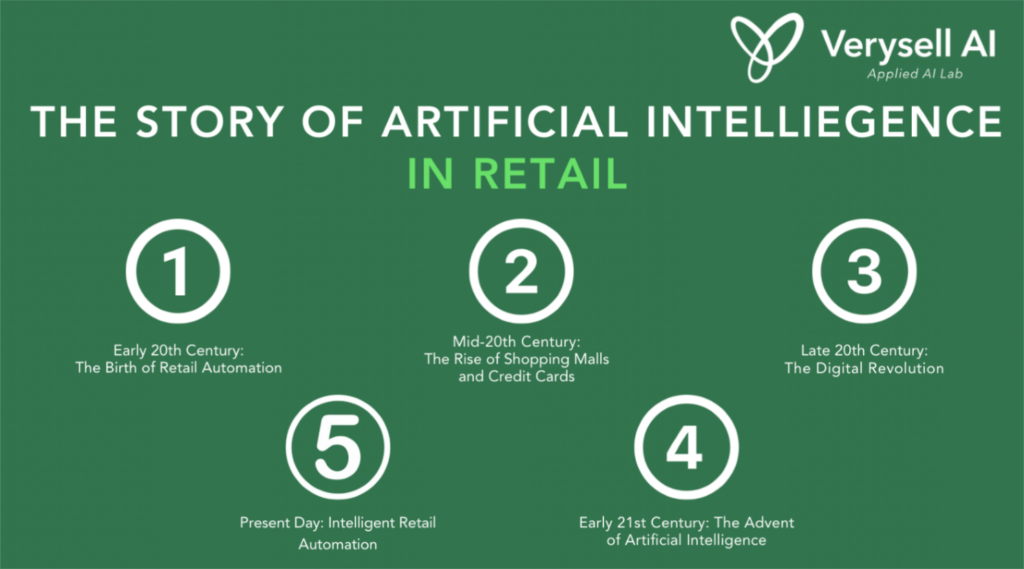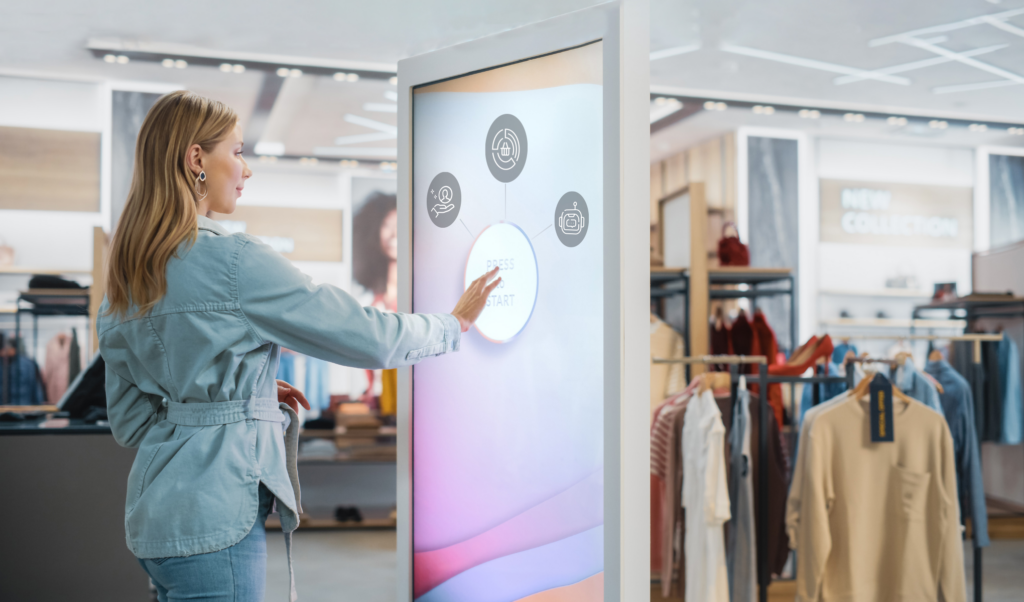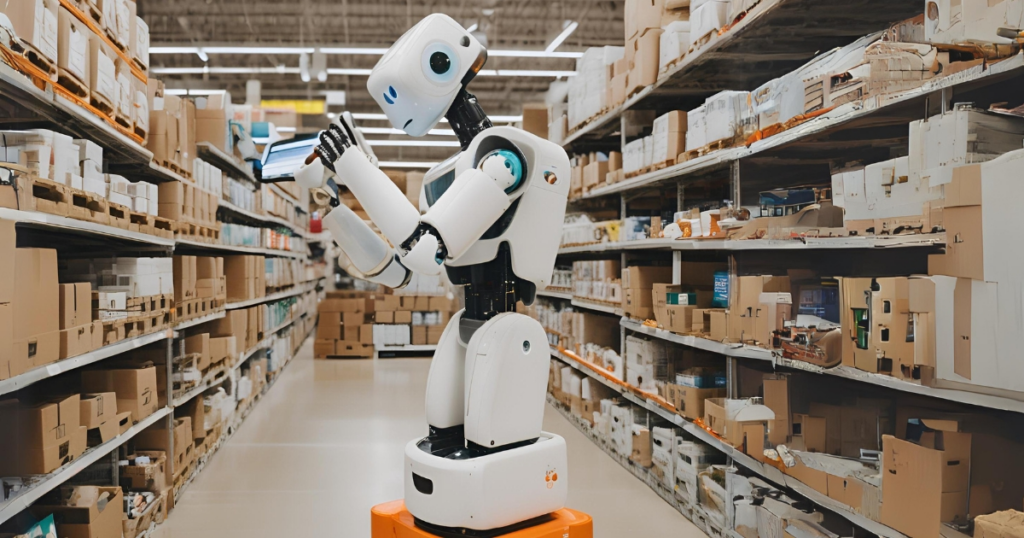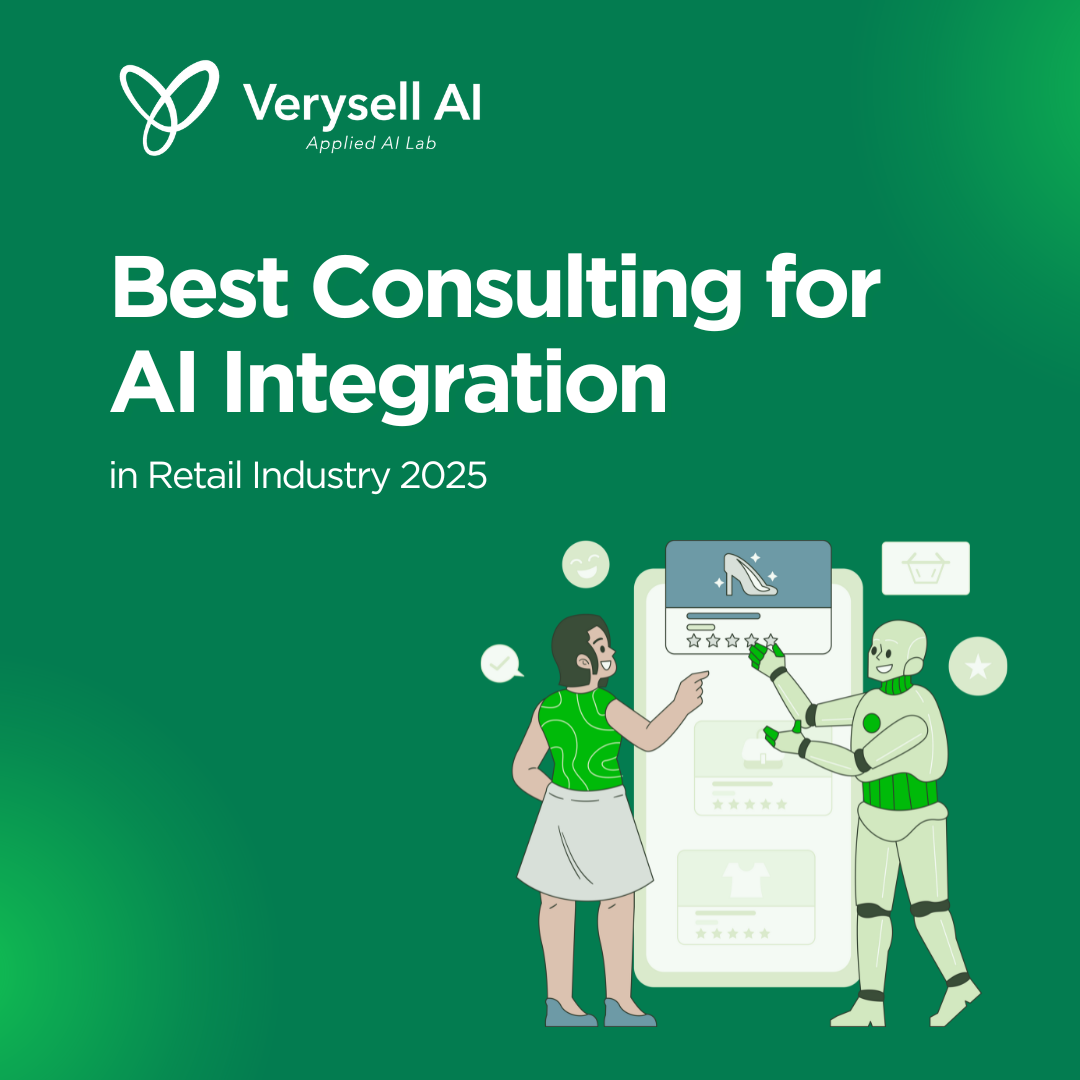AI integration in retail industry is transforming by improving customer experience, enhancing inventory management and optimizing supply chain, personalizing shopping experience and so on. Its influence extends across the whole retail value chain. By using AI, retailers are increasing productivity and profitability in addition to boosting consumer pleasure.
The data clearly show the magnitude of this change. According to a 2025 analysis by Precedence Research, the global artificial intelligence (AI) in retail market size is calculated at USD 14.03 billion in 2025 and is forecasted to reach around USD 62.64 billion by 2034, accelerating at a CAGR of 18.14% from 2025 to 2034. This quick expansion is a result of the growing use of AI to solve problems including changing customer habits, supply chain interruptions, and the need for highly customized experiences.
>> Read more: 4 AI in the Retail Industry Best Cost Reduction Suggestions

Adopting AI is now necessary to remain ahead in the competitive world of today. Retailers may streamline processes, provide seamless omnichannel experiences, and react proactively to market developments by incorporating AI into their plans. AI gives those who are willing to embrace its possibilities a crucial advantage as the business changes. In this blog post, we will examine how artificial intelligence is transforming the retail sector, emphasizing how it will change the business and why it is crucial for contemporary merchants to embrace it.
1. The Story of AI Integration in Retail Industry
From boosting retail trends to early generative AI adoption, the retail industry’s approach to AI has evolved to include agentic AI. AI-powered chatbots, automated check-out systems, and content creation are examples of early AI applications that concentrated on automating repetitive jobs and streamlining operational processes.

Retail automation has had an interesting trajectory, with major turning points that have changed the landscape of the sector. As AI systems go beyond automation and toward sophisticate d predictive analytics and decision-making, retail is already approaching the era of agentic AI. In contrast to classical AI, agentic AI solves intricate, multi-step problems without constant human assistance by using advanced reasoning and iterative planning. These AI agents are being used by retailers for seamless omnichannel experiences, adaptive pricing tactics, and end-to-end inventory optimization.
Retail Automation’s Inception in the Early 20th Century: Small, family-run businesses dominated the retail scene in the early 1900s. With the invention of cash registers, transactions were transformed and became more accurate and efficient. Future developments in retail technology were made possible by this invention.
The Development of Credit Cards and Shopping Malls in the Mid-20th Century: Large shopping malls began to appear in the middle of the 20th century, providing customers with a single destination for a variety of shopping requirements. At the same time, the introduction of credit cards revolutionized payment processes by adding a new degree of automation and ease to transactions.
The Digital Revolution in the Late 20th Century: The age of online shopping began in the 1990s, when companies such as Amazon redefined retail by providing a wide range of goods that could be purchased from the comfort of one’s own home. Enterprise Resource Planning (ERP) systems were also developed around this time, allowing merchants to combine a variety of company operations, such as customer interactions and inventory management, onto a single digital platform.
The emergence of AI in the early 21st century: Artificial Intelligence (AI) entered the retail industry in the 2000s, bringing with it sophisticated systems that could analyze large datasets to manage inventories, forecast consumer behavior, and customize customer experiences. Chatbots, recommendation engines, and automated checkout systems driven by AI have proliferated, improving consumer happiness and operational efficiency.
Current Situation: Intelligent Automation in Retail: AI is still driving innovation in retail today, as seen by the standardization of features like virtual changing rooms, automated on-model photography, and customized shopping experiences. Retailers are establishing new standards for the sector by using AI to provide smooth, effective, and captivating consumer experiences.
2. Improve Customer Experience with AI
Retailers’ connections with consumers are being transformed by AI, which is resulting in more relevant and customized exchanges. AI improves each stage of the customer journey by using sophisticated data analysis and predictive modeling, guaranteeing smooth and interesting interactions.

2.1 AI-powered product recommendations
AI-driven recommendation systems are revolutionizing both online and in-store shopping by gaining deep insights into customer preferences. These systems assess purchase history, browsing behavior, and demographic information to suggest products that align with individual tastes. For instance, e-commerce giants like Amazon utilize collaborative filtering to showcase “Customers who bought this also bought” suggestions, enhancing cross-selling opportunities.

2.2 Targeted marketing and advertising
AI has transformed marketing from a broad approach to a highly focused strategy. Retailers are now harnessing AI to analyze customer data and design personalized marketing campaigns that resonate with individual preferences. For, predictive analytics, AI anticipates customer desires, enabling retailers to deliver timely and relevant offers. Moreover, in the dynamic content, retail platforms utilize AI to tailor email campaigns, website banners, and social media advertisements based on user behavior and interests. Lastly, behavioral Segmentation is for AI segments customers into micro-groups, allowing for hyper-targeted campaigns that address specific needs. This level of precise targeting leads to higher conversion rates and a more engaging brand experience for customers.
2.3 Hyper-personalized in-store experiences
AI is not only enhancing digital experiences but also transforming physical retail environments. By integrating AI with technologies like IoT and augmented reality, retailers are crafting hyper-personalized in-store interactions through many use cases.

AI is transforming in-store experiences through innovations like smart mirrors, facial recognition, and real-time assistance. Smart mirrors in fitting rooms suggest accessories or clothing based on what customers are trying on, enhancing their shopping experience. Some stores utilize facial recognition technology to identify returning customers, offering personalized greetings and tailored promotions that make shoppers feel valued. Additionally, AI-driven mobile apps provide instant support, helping customers locate products or suggesting alternatives based on current stock levels. These advancements create a more engaging and personalized retail environment, bridging the gap between digital and physical shopping.
These innovations create a unique and immersive shopping environment, bridging the gap between online personalization and in-store engagement. By leveraging AI across these domains, retailers are not just meeting customer expectations, they are exceeding them, fostering loyalty and establishing new standards for the retail experience.
3. Enhance Inventory Management
AI is revolutionizing operational efficiency by automating manual tasks, allowing employees to concentrate on higher-value activities. In supply chain optimization, AI identifies inefficiencies, helping to reduce costs and minimize delays. Additionally, automation in warehousing utilizes robotics and AI-powered systems to manage tasks such as sorting, packing, and shipping, streamlining the entire process. Moreover, AI plays a crucial role in fraud detection by monitoring transactions in real-time, identifying anomalies that can prevent fraudulent activities. This comprehensive approach not only enhances productivity but also strengthens security across various operations.
>> Read more: 5 Powerful Ways AI Chatbots in Retail Reduce Business Costs

4. Optimize Supply Chain
AI is significantly enhancing supply chains by optimizing logistics, tracking, and supplier management, resulting in a more efficient and responsive process. For instance, AI algorithms are employed for route optimization, identifying the most efficient delivery paths that reduce transportation costs and improve delivery times. With AI-enabled IoT sensors, retailers can achieve real-time tracking of shipments, providing better transparency and enabling quicker responses to any delays.

Furthermore, AI fosters improved communication and planning with suppliers by forecasting demand and ensuring timely procurement. It also plays a vital role in risk management, identifying potential risks in the supply chain such as geopolitical issues or natural disasters and suggesting appropriate contingency plans. These AI-driven advancements empower retailers to create a more resilient and agile supply chain, well-equipped to navigate today’s dynamic market conditions. By leveraging AI across these operational areas, retailers are not only streamlining processes but also paving the way for a more sustainable and customer-centric future.
5. Engage Demand Forecasting
AI-powered demand forecasting has transformed the way retailers anticipate customer needs. By analyzing historical sales data, market trends, and external factors such as weather and holidays, AI delivers highly accurate forecasts. This capability enables retailers to maintain improved stock levels by predicting which products will be in high demand and when.

>> Explore more: Top 7 AI in the Retail Trends in 2025: Retailers should follow
Additionally, AI allows for real-time adjustments to forecasts as new data emerges, such as sudden spikes in demand or supply chain disruptions. This dynamic approach helps retailers reduce the risks of costly overstocks and minimize lost sales due to stockouts, ensuring smoother operations and enhancing overall customer satisfaction.
Real-world Case Studies
1. WISMO (“Where Is My Order?”) Case
Although there aren’t many concrete case studies on this use case, UK merchants’ increasing desire for WISMO updates is true. 73% of UK consumers prefer an immediate response to their WISMO inquiries over waiting for a callback or email, according to research of more than 50 UK retailers done in collaboration. Additionally, 80% of UK consumers want customer service teams to have access to courier and delivery data so they can accurately provide order status updates. According to a third (33%) of UK retailers surveyed, they will now extend AI usage roadmaps to improve the post-purchase experience for consumers.

2. Liberty London Case
In order to provide a “premium” client experience across several channels, Liberty London, a luxury department store, had to update its customer care department. To get complaints routed and “solved as quickly as possible,” it contracted out an AI system that recognized and tagged client intent, emotion, and language. The shop saw a 73% reduction in initial reply time, an 11% reduction in ticket resolution time, and a 9% boost in customer satisfaction by eliminating bottlenecks in all aspects of customer service operations.

>> Read more our newsletters on Linkedin: Smarter, Faster, Autonomous: How Agentic AI is Rewriting Retail Rules
Conclusion
AI has completely changed the retail sector, changing everything from how consumers purchase to how companies run. Retailers now have more options for productivity, consumer interaction, and customization thanks to AI. In a market, retailers that incorporate AI into their strategy will not only survive but also prosper. The moment has come to go forward. AI presents many chances for innovation, and companies will have a bigger edge in the coming years the sooner they use these technologies.


